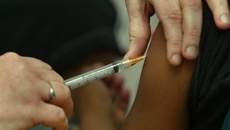
There are 8150 new community cases of Covid-19.
Eleven people with Covid-19 have died, the Ministry of Health says.
In a statement, the ministry said there were 368 people with the virus in hospital, including 11 in ICU.
"We are today reporting our first case of the Omicron subvariant BA.2.12.1 in a community case, without a clear link to the border, in Hawke's Bay from a test result returned on 10 May 2022."
"This Omicron subvariant is prevalent in the USA and has been detected at our border for many weeks - there have been 29 imported cases reported since April, so its movement into the community is not unexpected.
The ministry said emerging data suggested BA.2.12.1 was marginally more transmissible than the subvariants currently circulating in Aotearoa New Zealand.
"Our genomic surveillance (genomes and wastewater) remains in place to study any new variants and track their spread."
The public health settings already in place to manage other Omicron variants were assessed to be appropriate for managing subvariants present in the community and no changes are required, the ministry said.
Meanwhile, the Omicron BA.4 and/or BA.5 subvariants have been detected in wastewater samples at Rosedale on Auckland's North Shore and in Gisborne.
However, health authorities said the presence of these subvariants in the community was not unexpected.
"The BA.4 and BA.5 subvariants are being monitored by the World Health Organization; to date, compared to BA.2, there is clinical data to suggest an increased transmissibility but no data suggesting it causes more severe illness.
The ministry said as with all variants of Omicron, the public health advice remained the same. Getting boosted remained one of the best defences against Covid.
Wear a mask indoors, stay home if you're unwell, get tested if you're symptomatic, and get vaccinated, the ministry said.
Yesterday there were 8435 new cases in the community and a further 15 Covid-related deaths were reported.
There were 327 people in hospital with the virus, including 10 in intensive care.
President of the New Zealand Principal's Federation, Cherie Taylor-Patel, said during winter all schools have always had issues finding relief teachers but this year the impact of Covid was making the situation more difficult.
"Schools are having to be incredibly resourceful and their using all the different ways they can to cover classes and to make sure that students have good days of learning but it is definitely a challenge," said Taylor-Patel.
One of those schools that is having to adapt is Auckland's Mount Roskill Grammar School which changed their daily schedule from five periods to four periods on Friday and this schedule will remain for two weeks.
The school said this system allowed for classes to be staffed effectively by those teachers who were not isolating or feeling unwell and allowed for all students to continue going to school.
School for those students starts at the normal time of 8.55am but finishes most days at 1.35pm and 1.30pm on Wednesdays.
Avondale College have also had to adapt as a significant amount of staff have become unwell.
Tomorrow, a rostering home system comes into effect which sees each year group take turns to learn from home one day a week.
"Rostering home will continue until we are confident we can advise staffing levels have returned to normal," the school wrote in a notice.
"Schools are working really hard to try and keep programmes consistent, to make sure they've got the sequential nature that sees students making progress and achieving key milestones," said Taylor-Patel.
Taylor-Patel said disruptions to teaching not only impacts students learning but also their wellbeing.
She said staff shortages and no luck finding reliving teachers means other teachers have to work more, often in their release time, to cover classes and opportunities to offer specialist, support and extension teaching programmes are reduced.
"There is certainly a knock-on effect, people being unwell, it definitely impacts on the whole organisation but also on the wellbeing of students," said Taylor-Patel.
In July last year, Education Minister Chris Hipkins announced a new class border exemption that made way for 300 overseas qualified teachers to come to New Zealand under.
Taylor-Patel believed all these spots had now been filled, and she said while this was great, more needed to be done to fill the current teacher shortage issue.
"We probably need another 300 to be able to come into the country to cover the shortfall," she said.
She said teachers needed to be urgently re-prioritised in the migrant visa waiver process.
"It is something that is quite urgent that needs to be done now so that when the full impact of winter is on us, we have some solutions that we can offer rather than just relying on the resources we have within the sector," she said.
Its not just schools feeling the impacts of teacher shortages and relief teacher issues, on Monday Wellington's Kindercare in Karori requested that some children be kept at home as two teachers became close contacts of Covid positive cases and with no agency relievers available to cover them.
Take your Radio, Podcasts and Music with you









